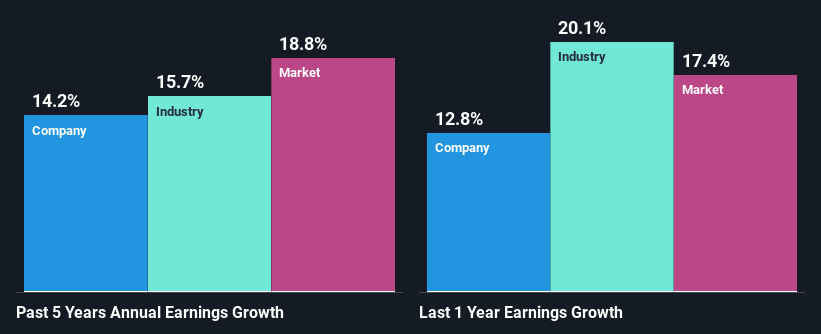Syncom Formulations (India) Limited's (NSE:SYNCOMF) Stock Has Seen Strong Momentum: Does That Call For Deeper Study Of Its Financial Prospects?
Syncom Formulations (India)'s (NSE:SYNCOMF) stock is up by a considerable 14% over the past week. We wonder if and what role the company's financials play in that price change as a company's long-term fundamentals usually dictate market outcomes. Particularly, we will be paying attention to Syncom Formulations (India)'s ROE today.
Return on equity or ROE is a key measure used to assess how efficiently a company's management is utilizing the company's capital. In short, ROE shows the profit each dollar generates with respect to its shareholder investments.
View our latest analysis for Syncom Formulations (India)
How To Calculate Return On Equity?
The formula for ROE is:
Return on Equity = Net Profit (from continuing operations) ÷ Shareholders' Equity
So, based on the above formula, the ROE for Syncom Formulations (India) is:
8.0% = ₹206m ÷ ₹2.6b (Based on the trailing twelve months to June 2023).
The 'return' is the income the business earned over the last year. So, this means that for every ₹1 of its shareholder's investments, the company generates a profit of ₹0.08.
Why Is ROE Important For Earnings Growth?
So far, we've learned that ROE is a measure of a company's profitability. Depending on how much of these profits the company reinvests or "retains", and how effectively it does so, we are then able to assess a company’s earnings growth potential. Assuming everything else remains unchanged, the higher the ROE and profit retention, the higher the growth rate of a company compared to companies that don't necessarily bear these characteristics.
Syncom Formulations (India)'s Earnings Growth And 8.0% ROE
It is hard to argue that Syncom Formulations (India)'s ROE is much good in and of itself. Even when compared to the industry average of 12%, the ROE figure is pretty disappointing. Syncom Formulations (India) was still able to see a decent net income growth of 14% over the past five years. Therefore, the growth in earnings could probably have been caused by other variables. For instance, the company has a low payout ratio or is being managed efficiently.
As a next step, we compared Syncom Formulations (India)'s net income growth with the industry and found that the company has a similar growth figure when compared with the industry average growth rate of 16% in the same period.

The basis for attaching value to a company is, to a great extent, tied to its earnings growth. It’s important for an investor to know whether the market has priced in the company's expected earnings growth (or decline). This then helps them determine if the stock is placed for a bright or bleak future. One good indicator of expected earnings growth is the P/E ratio which determines the price the market is willing to pay for a stock based on its earnings prospects. So, you may want to check if Syncom Formulations (India) is trading on a high P/E or a low P/E, relative to its industry.
Is Syncom Formulations (India) Efficiently Re-investing Its Profits?
While the company did pay out a portion of its dividend in the past, it currently doesn't pay a dividend. We infer that the company has been reinvesting all of its profits to grow its business.
Conclusion
Overall, we feel that Syncom Formulations (India) certainly does have some positive factors to consider. Even in spite of the low rate of return, the company has posted impressive earnings growth as a result of reinvesting heavily into its business.
New: Manage All Your Stock Portfolios in One Place
We've created the ultimate portfolio companion for stock investors, and it's free.
• Connect an unlimited number of Portfolios and see your total in one currency
• Be alerted to new Warning Signs or Risks via email or mobile
• Track the Fair Value of your stocks
Have feedback on this article? Concerned about the content? Get in touch with us directly. Alternatively, email editorial-team (at) simplywallst.com.
This article by Simply Wall St is general in nature. We provide commentary based on historical data and analyst forecasts only using an unbiased methodology and our articles are not intended to be financial advice. It does not constitute a recommendation to buy or sell any stock, and does not take account of your objectives, or your financial situation. We aim to bring you long-term focused analysis driven by fundamental data. Note that our analysis may not factor in the latest price-sensitive company announcements or qualitative material. Simply Wall St has no position in any stocks mentioned.
About NSEI:SYNCOMF
Syncom Formulations (India)
Manufactures, markets, and sells pharmaceutical formulation products in India and internationally.
Flawless balance sheet with solid track record.
Market Insights
Community Narratives



